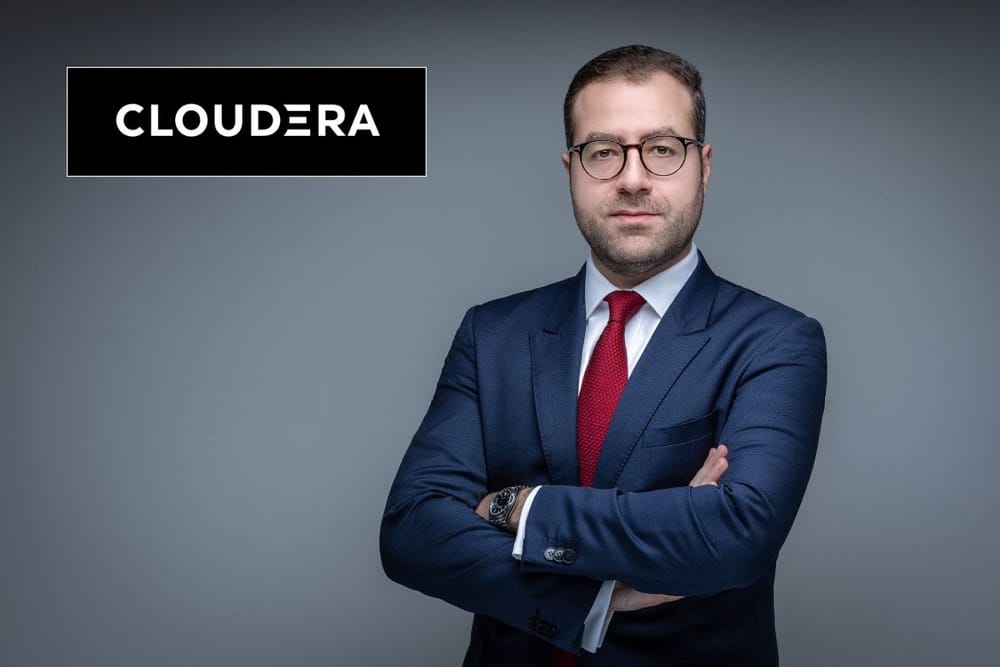With a rich history in sales and a commitment to helping businesses harness the power of data, Karim Azar, Regional Vice President for the Middle East and Turkey at Cloudera, has made significant strides in the region since joining the company in 2018. Leveraging his expertise in negotiations, macroeconomics, and customer relationship management—honed from his tenure at global organizations like HSBC and BMC Software—Karim focuses on driving digital transformation for businesses. An alumnus of prestigious institutions such as the London School of Economics and University College London, his in-depth understanding of business needs and tech innovation has helped many organizations in the region achieve tangible value.
In this interview, Karim shares insights into Cloudera’s evolution, the importance of AI adoption, and how Cloudera's hybrid model and open-source philosophy give it a competitive edge in the rapidly advancing data and AI landscape.
Cloudera handles an impressive 25 exabytes of data yet operates as a cloud platform rather than a hyperscaler. How would you describe the company’s journey and its evolution over the years?
From our perspective, Cloudera has always been a data platform, and we’re incredibly proud of what we’ve accomplished over the past 10-15 years. We serve some of the largest and most complex customers across various industries.
Today, we manage around 25 or 26 exabytes of data.
This success is due to our expertise in handling complexities and managing data at scale. In terms of data under management, we surpass many hyperscalers, whether in the UAE or globally. We’ve been doing this job exceptionally well, and we’re proud to manage such a massive amount of data.
Given the UAE government's active investment in AI, do you find it easier to navigate regulations here compared to other regions?
If you look at the UAE, it has always been a pioneer in everything it does, whether in infrastructure or regulations. The UAE has been ahead of the curve and leads the GCC in many areas. When it comes to regulations, they are setting the standard for the region, making it easier to navigate here. Some of the first hyperscalers to enter the GCC were established in the UAE. Microsoft, AWS, and even IBM have their own data centers here.
The regulatory environment is more cloud-friendly and vendor-friendly, thanks to the openness and innovation goals the UAE set 10-20 years ago. This isn’t a recent development; it's part of a long-standing trend we've observed over the years.
Was the hybrid cloud model always part of Cloudera’s vision, or did it evolve?
I would say it's a bit of both. If you go back to when Cloudera was founded, there were two companies: Cloudera and Hortonworks. In 2018/2019, the two companies merged, retaining the Cloudera name. That was a key inflection point where we gained a better understanding of the market. During 2020/2021, especially around the time of COVID-19, everyone was pushing for a "cloud-first" approach. However, Cloudera took a different path. We listened to our customers—some of the biggest and most complex businesses—and understood their needs. They made it clear that multi-cloud and hybrid solutions were crucial. Many industries face complexities that make moving entirely to the cloud a long, difficult process, often due to regulatory concerns, privacy issues, and the sensitive nature of their data. That realization led us to bet on the hybrid cloud strategy. And now, we’re seeing other cloud providers and SaaS companies following a similar approach, adjusting their models to address hybrid and on-premise needs. It was a bet we made early, and it’s paying off significantly.
We’ve seen waves of tech trends—big data, cloud computing, and now AI. How do you manage clients who jump on the AI bandwagon without having a clear implementation plan?
This is definitely a challenge we’re seeing. Everyone wants to hop on the AI bandwagon, whether they are SMBs or large enterprises. But many, especially SMBs, are not ready to adopt AI because they don’t have the necessary infrastructure in place. There's a big rush and hype around AI, particularly Gen AI, and most CEOs and CIOs want to implement it. However, not everyone will be able to meet the timelines they're aiming for.
It’s important to take a step back and ensure the foundational elements are in place first—proper governance, security, and a well-established data lifecycle. Only then can AI be effectively integrated to deliver real value.
For companies seeking quick wins, AI can be implemented on a smaller scale, but for those looking at the bigger picture, they need to consider how AI can enhance their business, whether by generating more revenue, reducing costs, mitigating risks, or boosting brand reputation.
A big focus of Cloudera is promoting AI as a tool that helps make better business decisions. Could you explain how AI can do this?
Many people think AI is here to replace the workforce, but we see it as a tool to enable businesses to perform better, improve their operations, and become more competitive by increasing productivity. If you look at historical data, companies that generated a billion dollars used to require tens of thousands of employees. Over time, that number dropped to thousands, and now we see billion-dollar companies with just a small team. This is where AI plays a crucial role—it boosts productivity per employee, enhances enablement, and shortens the learning curve. For businesses, deploying AI at the right time and in the right place can provide a significant competitive advantage, accelerating their position in the market.
We view AI as a large-scale enabler, and the more widely it’s adopted, the faster economies can grow.
People are now discussing the concept of "digital GDP," which focuses on how technology, particularly AI, can boost not only a company’s performance but also a country’s economy. Some key performance indicators (KPIs) are being tracked to measure this impact, highlighting the importance of AI in driving future growth. I would encourage every individual, company, and country to take AI seriously and explore its potential.
What are the KPIs that people are looking at for Digital GDP?
Digital GDP relates to how an economy grows due to technology and its digital transformation. Certain countries, like Singapore, are ahead of the curve, leading with AI and innovation. Dubai is another example of a city at the forefront of this movement. The KPIs for digital GDP involve several initiatives tied to technology, with AI and data playing a central role. The more data you collect, the more effectively you can leverage AI, which keeps you ahead of the curve. Ultimately, it comes down to innovation, vision, and the extent to which you can push the boundaries of technology. These are some of the key factors that will drive economies toward becoming fully digital.
In June 2024, Cloudera acquired Verta’s Operational AI Platform. How does this acquisition align with your goal of becoming the go-to partner for AI adoption?
At Cloudera, we focus on three main pillars: modernizing data architectures, achieving true hybrid capabilities, and accelerating AI adoption.
To accelerate AI, like any other company, we can either do it organically or through mergers and acquisitions. We saw Verta as the perfect fit for Cloudera because, when we look at our Cloudera Machine Learning (CML) platform, Verta helps us deploy models at scale and operationalize them for our customers. With the increasing buzz around Generative AI and large language models (LLMs), everyone is eager to deploy LLMs that integrate seamlessly with existing security and governance policies. This is where Cloudera comes in—we help customers implement these pre-built LLMs into their platforms while maintaining governance and policy standards, reducing time to market for AI use cases. The Verta acquisition is a strategic move that has been well-received by the market and our customers. If we continue on this path, we’ll remain a major player in data and AI.
In your opinion, what are the biggest hurdles for companies in the UAE when adopting AI, and how does Cloudera help overcome them?
In the UAE, there’s a strong desire to get things done quickly. However, with AI, it's crucial to have the right platform in place. By platform, I mean both the software and infrastructure. On the software side, you need to ensure the entire data lifecycle is covered before deploying AI. But beneath that, you also need accelerated computing power—what people refer to as GPUs. You’ve probably heard the buzz around Nvidia and how their stock price has skyrocketed. This is because their chips enable companies to significantly speed up their computing power and process much more data, much faster.
These are the two main challenges in the UAE: having the right platform with proper governance, security, and know-how, and having access to the necessary infrastructure, such as GPUs.
Some companies struggle to get their hands on GPUs and may wait for years. So, it's a combination of both infrastructure and expertise. If companies can secure the right infrastructure and governance, they can accelerate their AI adoption. These challenges will improve over time, but they are critical at present.
From our side, we’ve built strong partnerships with all the major cloud and hardware providers, including Nvidia. This allows us to provide the necessary infrastructure and ensure that our customers can run their data platforms regardless of which hardware vendor, hyperscaler, or chip they are using. We also offer comprehensive support for the entire data lifecycle, from the moment data is created to deploying generative AI models.
Cloudera serves as a solid foundation for companies looking to future-proof their operations. We provide a unified form factor, allowing customers to move seamlessly between different clouds—whether public or on-premise—without having to refactor their workloads or applications. By solving the infrastructure challenges and providing a secure, reliable data platform, we ensure that our customers are in the best possible position for success and guarantee a return on their investment.
Can you share some success stories from companies in Dubai that have used Cloudera’s solutions to achieve transformative results?
Here in the UAE, we have a strong presence in telecommunications, banking, the public sector, and airlines. On September 12th, 2024, we hosted our flagship event, Evolve, where many of our customers and partners joined us on stage to share their experiences.
In Dubai, some notable examples include Emirates NBD, the largest bank in Dubai and one of the top three banks in the region, and Emirates Airlines, the largest airline in the world.
Emirates NBD has been a partner of ours since 2016, and we’ve seen their journey evolve with our data platform. Today, Emirates NBD likely touches most Dubai residents, using Cloudera for critical use cases such as fraud detection, anti-money laundering, and foreign exchange. We also help them with cross-selling and upselling, enabling their marketing team to reach customers more effectively with the right products or incentives, ultimately driving business growth.
Emirates Airlines has built its data platform on Cloudera, and now, all its departments—HR, finance, cargo, Skywards, and more—rely on Cloudera to make intelligent, data-driven decisions.
Regionally, we also work with some of the biggest names, including Saudi Aramco, the largest company in the world, and STC and Zain Group in telecommunications.
These companies trust us to manage complex data needs, and this is where we excel—partnering with industry giants to navigate and solve their most challenging data problems.
What is the size of the user base for the Cloudera Data Platform here in Dubai? What industries and companies are leading the adoption?
This is a bit of a challenging question because the market share is very dynamic. Things, especially in the realm of data, are evolving and moving at a rapid pace. However, there are certain industries where we are very dominant, not just in the region but globally. In other industries, our presence may be less dominant. But when it comes to complex organizations, that's where we excel. As I mentioned earlier, we have a strong presence in sectors like banking, telecommunications, airlines, and the public sector. We also perform well in the healthcare industry.
Cloudera went public in 2017 and returned to private ownership in 2021. Can you walk us through the reasoning behind this shift?
Cloudera went public, followed by the merger with Hortonworks. Later, we went private through a deal with CDI and KKR. KKR, one of the largest private equity firms in the world, has a strong track record of making the companies they acquire very successful. They focus on American and global tech companies, setting them up for long-term success.
Our CEO, Charles Sainsbury, mentioned during his speech in Dubai that over the past 3-4 years, we have invested about a billion dollars in R&D. This investment went directly into improving our product, and this was made possible by being a private company.
As a private company, we don’t face the constant pressure of the public market to report numbers and growth. While we’re still growing and maintaining strong margins, the freedom from public market pressure has allowed us to focus heavily on product innovation.
This billion-dollar investment has led to significant improvements across our offerings in public cloud, on-premises, and private cloud environments. We are now seeing the true hybrid model become a reality. The focus remains on continuing to innovate and advance. Being a private company has placed us in a fantastic position, and from a cultural standpoint, Cloudera has been great. I’ve been with the company for six years, and that’s a testament to the right culture and vision. Every day reaffirms that both employees and customers made the right choice in betting on Cloudera.
Cloudera has seen over 100% growth in the public cloud space over the last year. Could you clarify what this growth entails in terms of revenue and what factors drove such rapid success?
This growth is driven by our true hybrid approach. Our existing customers have trusted us to move some of their workloads and applications to the cloud, leading to significant acceleration in cloud adoption. Cloudera is available on AWS, Azure, and GCP, and we’ve seen many customers transitioning to the cloud with Cloudera, as well as new customers joining us.
The key factor is our ability to offer a true hybrid model, allowing customers to move from one cloud provider to another without needing to refactor their workloads or applications. Additionally, they can repatriate these workloads back to on-premises if needed.
There has been a strong demand for the agility that the public cloud offers, especially for training AI models and exploring Gen AI use cases. This has fueled the rapid growth in our public cloud presence. As a private company, we can’t disclose specific revenue figures, but achieving over 100% growth—triple-digit growth—is a point of pride. Our challenge now is to maintain this pace of growth in a highly competitive space, but our customers' trust in our cloud partnership speaks volumes about our success.
As someone who's been with Cloudera for a while, how have you seen customer needs evolve over the years, particularly when it comes to AI adoption?
Customer needs have evolved significantly, especially in the last 18 months with the rise of Gen AI and the impact of technologies like ChatGPT. It has fundamentally shifted the way customers think about and adopt AI. When I first joined, most customers were focused on on-premises solutions. Then came the push for cloud, followed by hybrid strategies. Now, the focus is heavily on AI. At Cloudera, we've seen a tremendous acceleration in AI adoption, both within our company and across the industry. Our AI-related solutions are our fastest-growing offerings, which reflects how eager the market is to adopt AI and Gen AI as quickly as possible.
With your extensive background in tech, what do you think differentiates Cloudera from its competitors in the crowded data and AI space?
Our unique advantage comes down to a few key things. As I mentioned earlier, Cloudera's three pillars are modernizing architectures, accelerating AI, and hybrid capabilities.
I believe hybrid is our true advantage.
We offer the ability to move workloads and applications across different cloud providers, as well as between private cloud and on-premise environments. This gives our customers a level of flexibility and security—essentially, it's like an insurance policy for their future decisions.
Another differentiator is our commitment to open source.
When we talk about hybrid and modernizing architectures, we ensure that our customers own their own data. Owning their data helps them trust it more. Cloudera doesn’t collect or host this data; instead, we provide customers with the tools to manage their data platforms effectively and drive revenue or reduce costs through data-driven outcomes. Our reliance on a hybrid strategy and open source, coupled with a strong focus on data security and privacy, ensures that all customer data belongs solely to them. At no point do we interfere with their data. I would say these are key factors that set us apart from our competitors, especially our open-source approach.
As Vice President for the Middle East and Turkey, have you noticed any regional trends or differences in Cloudera’s operations compared to its global presence?
The Middle East has always been a unique region due to its geography and political landscape, which has played a significant role in how things operate here.
Compared to regions like the US, Europe, or Asia-Pacific, cloud adoption in the Middle East has been slower.
This is largely due to trust issues, political factors, and delays in establishing local data centers. However, I think the Middle East has taken a more cautious and considered approach to cloud innovation, which was necessary given the circumstances.
Now, we're seeing a rapid shift toward cloud and hybrid solutions in the region. Hybrid cloud has become the de facto way of managing data and using different cloud providers, rather than relying on just one. We've also seen the rise of local cloud providers, such as G42 in the UAE, which allows businesses to keep their data within the country, ensuring data residency and sovereignty.
While there was a delay in cloud adoption in this region, it's now moving full-speed toward cloud and hybrid solutions.
Looking ahead, what are your plans for Cloudera’s enterprise AI products? Are there any new developments in the pipeline?
The billion-dollar investment we've made in R&D over the past five years is focused on our three pillars, and AI is one of those pillars. We plan to continue developing and accelerating AI, releasing new products, new features, and exploring both organic and inorganic growth opportunities. This is the direction we’ve been heading in for the past few years, with a strong emphasis on hybrid cloud and AI. Ultimately, our goal is to ensure that customers get these benefits and features from Cloudera rather than from someone else.
Also Read:
















